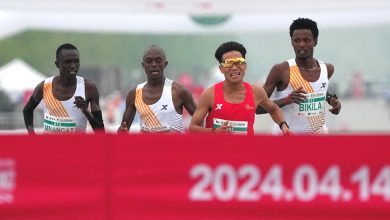How Olympians Embraced Mental Health After Biles Showed the Way

BEIJING — Simone Biles will not be competing at the Winter Olympics in Beijing. But she will be there, in spirit, in the minds of many of the best athletes.
Biles’s legacy among fans is as one of the top gymnasts in history. But for other Olympians, even those competing in winter sports, Biles is an inspiration of another sort.
She gave voice to the feelings they have shared — the doubts, the worries, the pressures. In speaking openly about mental health, along with other star athletes like the tennis player Naomi Osaka, Biles gave tacit permission to be vulnerable. She reminded fans, friends and family that even the best athletes in the world have feelings and fears.
“What Simone Biles did was just so strong and such a strong message for all of us, just to know that it’s OK to not be OK,” said Anna Gasser, a gold medal-winning snowboarder making her third Olympic appearance.
“I feel like it was a game changer,” Gasser added. “Simone Biles’s message was that we’re not just athletes — that we are also humans and not robots.”
The Biles echo was felt in Beijing as athletes coped with the struggle of the pandemic and the unpredictability of coronavirus testing. The American figure skater Vincent Zhou had to drop out of the Winter Games after he tested positive Monday; he announced the news on social media, in an emotional five-minute video of himself fighting back tears in his hotel room.
“I’ve taken all the precautions I can,” he said. “I’ve isolated myself so much that the loneliness that I felt in the last month or two has been crushing at times.”
It was at the Tokyo Summer Olympics last August that Biles pulled herself from competition. She took a clumsy turn on the vault, felt that she was not in the right frame of mind, and dropped out of the team final.
Fans accustomed to seeing Biles smiling and winning, as if her reason for being was to entertain and amaze, were surprised. There were signs, of course, none more striking than Biles’s own words about a week before the Olympics when she told The New York Times that the happiest part of her career was “probably my time off.”
She was criticized by some for quitting. She was heralded by others for honesty.
Now the Winter Olympics are here. And for those about to compete, Biles is an role model — not for being infallible, but for being human.

Explore the Games
- Measuring the Medals: Which country is doing best might depend on who’s counting — and how.
- Olympians and Fear: What scares the most daring Winter Olympians? Three dozen athletes opened up about their fears.
- Rivalries to Watch: Many events in Beijing will be decided by a showdown between two top contenders.
- Slopestyle Breakdown: Zoi Sadowski-Synnott landed “the best run of my life” to win gold. Here’s how she pulled it off.
One by one, and more than ever, Olympic athletes are displaying their vulnerable sides. It is a healthy shift, they say, for competitors who spend most of four years working in relative seclusion, then are expected to be perfect when their Olympic moment comes.
“I could relate with Simone because, even being six months out from that point, I was already feeling the pressure and the heat,” said the American snowboarder Jamie Anderson, a two-time gold medalist in slopestyle who qualified for Beijing. “And life has gotten so crazy lately that it’s hard to manage anything.”
Stress is exacerbated by the coronavirus pandemic. As in Tokyo last summer, athletes in Beijing will not have friends and family with them because of strict protocols restricting travel to China, where foreign fans have been barred.
That has simply turned up the heat in the pressure cooker. Anderson, 31, a Californian who exudes a hippie vibe of centered cool, said that the stress of her first Olympics, in 2014, turned physical.
“I ended up, like, having alopecia, like a full bald spot on my head, and I was only 22,” she said.
She went on to win gold, and then win gold again in 2018. She admitted what Biles already knew: that expectations soar higher with each success.
“It can be over the top for all of us, especially going back to defend the title,” Anderson said. “Everyone kind of has their hopes set on you. Everyone’s like, ‘Bring home gold!’ But it’s, like, well, is silver not that good? Or bronze? It’s a psycho amount of pressure.”
It is not just defending champions who struggle under the weight. Faye Gulini, 29, has been one of the world’s best snowboard cross athletes of the past decade. But her sport, where athletes race downhill in a pack, over big jumps and around banked corners, is both dangerous and unpredictable.
“I could be top three in the world for 10 years, and no one cares unless you have an Olympic gold medal,” she said. “And I shouldn’t care. But I do. I want that hardware. I want something that says I sacrificed so much and I worked so hard for so long, you know? I want something to hold on to when it’s all over.”
For athletes like Gulini, though, the pressure is not only to win. It is deeper than hardware. She began seeing a sports psychologist last summer for the first time.
“I was feeling like I was going to throw up,” Gulini said. “I had so much of that guilt, like, what did I not do to prepare for this moment or that moment? And it was almost like I couldn’t control it anymore. It was just this constant anxiety and pressure. And people asking, ‘Oh, this is your fourth Olympics?’ or ‘You’re going to win it?’ It’s not that easy. And it only gets harder.”
Gulini’s longtime teammate, Lindsey Jacobellis, has been a dominant snowboard cross athlete, too. But she has been saddled with a reputation for coming up short at the Olympics, since she fell doing a celebratory trick on her way to the finish line in 2006. Her tumble cost her the gold.
Gulini said that their sport might be the least predictable of all events. But the pressure builds far from the racecourse.
“What is hard is having your family, who’s spent their life savings, who’s dedicated everything to your success and only because they want it for you,” Gulini said. “What’s hard is coming up short for them, coming up short for your team, your teammates.
“I think my sport is an underdog sport, and if we don’t do well, the money that goes into growing our sport, at an adolescent level, it’s not going to be there — and eventually our sport could just vanish. It’s not just about my results, it’s about my team. If we don’t show the world what we do is cool, than no one’s going to do it.”
It is a common pressure that athletes feel, whether from others or themselves. If any Olympian can feel what it’s like to be Biles — considered the best of all time, carrying weighty expectations of strangers who presume that anything less than a gold medal is a failure — it is the snowboarder Shaun White.
Now 35 and headed to his fifth Olympics, White has won three Olympic gold medals in the halfpipe and spent a generation as the face of his sport.
“I don’t know her very well,” White said of Biles. “But if you want to think that there’s this much pressure from the outside world, there’s twice or triple the amount that you put on yourself.”
White said that Biles “performed amazing,” especially since she had a different type of pressure than he would feel — including the one-year postponement of the 2020 Tokyo Games and the fact that gymnasts often have only one shot at a routine, when snowboarders typically have two or three.
“I was pleased to see how people reacted, as another athlete in a different field,” White said. “And to see her really open up about how she was feeling and have the world embrace that, it’s really, really incredible to see.”
Biles and others have become a new kind of role model, not just for their talent, but their openness. How willing top athletes are to admit to their fears can be different by sport (some have a culture of stoic bravado), team, nationality and gender.
“It’s becoming less of a stigma than it was, at least in my experience on my team,” said Anders Johnson, a former ski jumper now coaching the United States women’s team. “The girls I work with are much more open to some of the things that are going on with them, whether it be fear, stress, anxiety, any of those mental health issues that they’ve struggled with.”
Jacqueline Wiles, an American Alpine skier, missed the 2018 Winter Games because of a broken leg and knee injury sustained days before the Olympics. That prompted her to begin working with a sports psychologist to ground her in a dangerous sport where vulnerability is often cloaked in bravado.
“It’s interesting that it’s more out there and all of a sudden, OK, yeah, people are more comfortable being vulnerable, talking about fear,” Wiles said. “It’s really cool because it’s allowing younger athletes who maybe would suppress those feelings, talk about it and be willing to get help with knowing how to deal with it at an earlier age.”
At those 2018 Olympics, in Pyeongchang, South Korea, the American freeskier Nick Goepper won a silver medal, improving on the bronze he had won four years earlier. Afterward, he used the Olympic forum to speak openly about his mental-health struggles, including alcohol abuse and thoughts of suicide.
He will compete in his third Olympics in Beijing, and said that he appreciates how much athletes are now willing to speak up as he did. He also said that national federations and sponsors are increasingly providing mental-health services.
“It’s really cool that it’s in a public forum more and more now,” Goepper said. “It’s accepted.”
The American ski racer Alice Merryweather sat out the 2020-21 season while confronting an eating disorder. She had gone to a training camp in September, hating the workouts and the time on the mountain, wondering where her love of skiing had gone. A doctor diagnosed her anorexia.
“I just kept pushing and I kept telling myself, ‘You’re supposed to love this, what’s wrong with you?’” Merryweather said. “I’m just trying to be the best athlete that I can be.”
Merryweather said that she began to open up to friends and teammates. Most knew someone else who had gone through a similar experience. “I realized, why do we not talk about this more?” Merryweather said. “I am not alone in this.”
She returned to skiing last summer, her love for the sport rejuvenated. She was headed toward the Olympics when she sustained a serious leg injury in a September training crash. The rehabilitation could take 18 months or more, meaning she will miss the Beijing Games and next year’s season, too.
She is willing to express her vulnerability to anyone who will listen.
“I’m afraid of what I can do to myself, after dealing with the eating disorder and knowing the darkness that I can experience when I’m not paying attention to myself and not listening to what I actually need,” she said. “I’m afraid that I’ll slip and I’ll relapse with the eating disorder. I’m fearful that I won’t prioritize, finding little bits of joy and passion her and there. And that I’ll spiral again. That’s something that I’m afraid of every single day.”
But she finds solace in knowing that her story, and her willingness to discuss it, might help others. And she is thankful to be one of the Olympians speaking out, opening up, moving friends and teammates and strangers into uncomfortable conversations, much as Biles did last summer.
Fans, she said, often see Olympians as performers — athletes lucky to do what they do, unaffected by the pressures both seen and unseen.
“I even thought that for a long time, that this is what I signed up for, so I need to be able to deal with it,” Merryweather said. “It wasn’t until I was really struggling that I realized, oh, OK, I actually do need to take care of myself. I’m a human. I can’t only be an athlete.”



